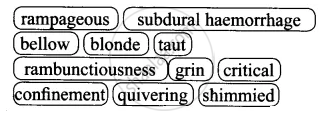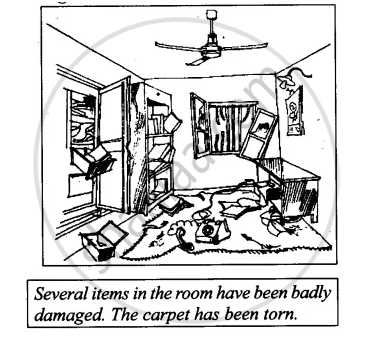Advertisements
Advertisements
प्रश्न
On the basis of your understanding of the poem, answer the following question
by ticking the correct choice.
The speaker says that she has paved the way for cavities and decay by __________.
पर्याय
eating the wrong food and not brushing.
not listening to his mother
laughing at his mother's false teeth
not listening to the dentist
उत्तर
eating the wrong food and not brushing.
APPEARS IN
संबंधित प्रश्न

a) This is the other word for trembling
(b) This is used for smile
(c) You call a person this if he/she has pale gold coloured hair.
(d) This is a quality which relates to high energy and noise
(e) This is related to dancing or moving in a way that involves shaking your hips and shoulders
(f) This is to express a tendency to show violent and wild behaviour often causing damage
(g) We use it for a condition which is serious, uncertain and dangerous
(h) This is a state in which one is forced to stay in a closed space
(i) This is a medical condition involving bleeding in the brain
(j) It is a loud, deep shout to show anger.
(k) This is a condition when the rope or leash is stretched tightly
Answer the following question briefly:
How did Private Quelch manage to anger the Corporal?
Answer the following question:
What was strange about the manner in which Mrs. Bramble addressed her son? What did he feel about it?
Identify the rhyme scheme of the poem.
The poem is full of images that come alive through skilful use of words. Describe
any two images that appeal to you the most, quoting the lines from the poem.
Fill in the blanks to complete the following paragraph that highlights the theme of
the poem. Use the words given in the box below.
decision sorry foresee choices pleasant direction
fork trail rewarding chance wonder both
The poem "The Road Not Taken" by Robert Frost is about the __________ that one
makes in life. It tells about a man who comes to a ___________ in the road he is
travelling upon. He feels ___________ that he can not travel___________ paths as he
must choose one. Frost uses this fork in the road to represent a point in the man's life
where he has to choose the ___________ he wishes to take in life. As he thinks about
his ___________ he looks down one path, as far as he can see trying to ___________
what life will be like if he walks that path. He then gazes at the other and decides that the
outcome of going down that path would be just as ________________. At this point he
concludes that the ________that has been less travelled on would be more
___________ when he reaches the end of it. The man then decides that he will save the
other path for another day, even though he knows that one path leads to another and
that he won't get a ___________ to go back. The man then says that he will be telling
this story with a sigh, someday in the future suggesting that he will ___________ what
life would have been like if he had chosen the more walked path even though the path
he chose has made all the difference.
Teacher/ Student to read out the first part given . After you listen, answer the following questions :
Nuclear war has broken out in Europe. A school in England has been evacuated by airplane to an unknown destination. While flying over a tropical region, the plane is shot down and it bursts into flames , but the body of the plane containing the passengers falls to earth safely. A few boys (Ralph, Jack, Roger, Simon, Piggy and others) manage to scramble out. They have landed on an unnamed island which has coral reefs, beaches, caves and fruit trees. The novel tells their story.
a. What do you think happened to the boys and the plane they were flying in?
b. What happened to the other part of the plane?
c. How did Ralph attract the attention of the other boys?
d. What were the names of the first three boys who came to the meeting?
e. Why do you think the groups of boys were marching in two parallel lines?
f. Do you think there were any adults on the island? Why/ Why not?
g. Can you predict what happened to the boys next? For example, how did they organise themselves? What about shelter and food?
Be the Master of Ceremonies!
The Honey Bee Creative Club of your school is organising an annual cultural programme. You are the compere for the programme. Complete the following details by filling in with suitable modals and phrases. This will help you when you address a large audience.
Good evening, respected principal, teachers and my dear friends. Welcome to the Honey Bee Creative Club Cultural programme. The guest (a)_________ arrive. Many (b)__________presented this evening. We (c)__________ the programme with an invocation. The dancers are (d)__________ entertain you by performing the bhangra. The school choir (e)_________a song on National Integration. The programme (f)__________ with a formal vote of thanks by the principal.
Look at the following pair of sentences. Underline the modals and discuss why each one is used in that sentence.
e.g.
I must not take those pills. (I’m not allowed.)
I need not take those pills. (It is not compulsory but I may if I wish.)
(b) I needn’t go to the meeting if I don’t wish to.
2. (a) I can swim a length of the pool.
(b) I can swim in the pool on Saturdays.
3. (a) You ought to get a nice present for her.
(b) You have to get a nice present for her.
4. (a) Can I go to the toilet?
(b) May I be excused?
5. (a) I may come tomorrow if I have the time.
(b) I might come tomorrow but it’s going to be difficult.
Did you know?
Modals are a small group of verbs that are used to express possibility,
probability, capability, capacity, ability, obligation and predictions.
Some of the modals you learnt in this unit are
can
may
shall
could
might
should
Need, dare, had better are also modals.
Understanding Modals:
Modal Auxiliaries
A modal verb or auxiliary verb is a verb, which modifies another verb, so that
the modified verb has more intention in its expression. In essence the modal
verb expresses modality, the way in which something is being said.
The main modals are
Can: could; may: might; shall: should; will: would: must; ought to; need to;
have to.
The negative modals are
Couldn't; wouldn't; shouldn't; mustn't; needn't; oughtn't/ ought not to
| Modal | Examples | Uses |
| Can/ can't |
She can read and write It can rain today Can I borrow your pen? Can you lend me your notes? Can I carry your books? |
ability possibility /probability seeking permission request offer |
| Could/ couldn't |
Could I borrow your book? Could you please help me with this sum? We could go for a picnic on Sunday I think you could come first this time There was a time when I could work round the clock. |
seeking permission request suggestion possibility/ probability past ability |
| May |
May I have some water? May I help you? May I shut the door? India may become a super power by 2020. May God bless you |
request offer permission possibility/ probability wish/ desire |
| Might | They might sell their house as they need the money. | future possibility/ probability |
| Will /Won't |
It is very cold so I will stay at home. I will help you if you wish. Will you look after my dog for a day? It will rain tonight. I will get you a shawl from Srinagar. |
intention offer request prediction promise |
| Would/Wouldn't |
Would you mind if I come over tonight? Would five o'clock suit you? Yes it would. Would you pass the salt? Would you come to my party? Would you prefer tea or coffee? |
permission making arrangements request invitation preference
|
| Shall |
Shall I help you? Shall we meet at 3.00 pm outside Bakshi Stadium? |
offer making arrangements |
| Should |
We should check the timings of the train. You should listen to the advice of your elders. |
recommended action advice |
| Ought to |
You ought to do your duty. The bus ought to be here any minute |
advice probability |
| Must/mustn't |
We must make a move now. You mustn't tell lies. |
obligation necessity |
| Need |
He need not go to the market. You need to lose weight. I need to get the groceries. |
necessity compulsion insistence |
Present perfect passive
Inspector Narayan has been called to investigate a burglary. When he arrives, there is total chaos in the room. He makes notes about what has been damaged. You are Inspector Narayan. Look at the picture and complete the description, using the Present Perfect Passive.

